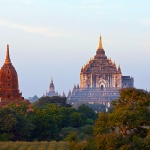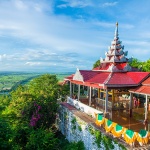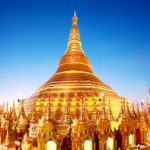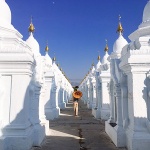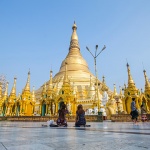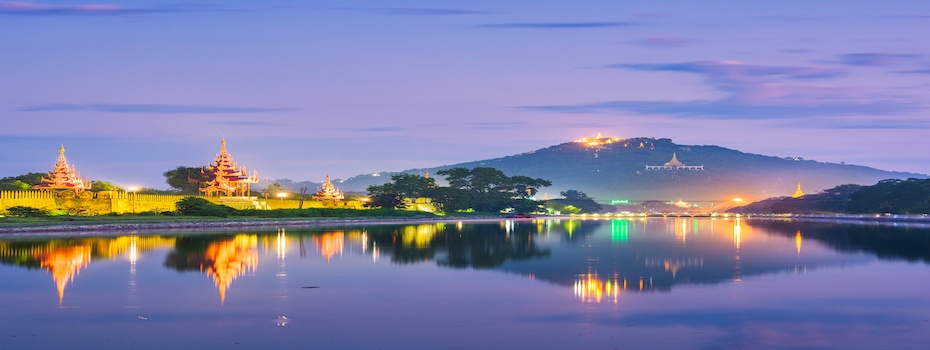Peak of Mandalay Hill
By Amy Nair
If you’re in Mandalay, look towards the horizon in the north east and you will see a hill with golden pagodas peaks jutting out of the thick green canopy of trees. This rare sight is Mandalay Hill, which gives the city of Mandalay its name.
A visit to Mandalay is incomplete without climbing up this 790-feet high hill and enjoying the panoramic view of the surroundings. One can see the beautiful Ayeyarwady river meandering in the distance and the hills fading in and out, sparkling in the horizon. It is a pleasure to watch the sun set as evening breaks, leaving orange hues colouring the sky.
A Historical Perspective
The history of Mandalay Hill dates back to the time of Buddha. According to legend, when Buddha visited Myanmar along with his disciple Ananda, he climbed Mandalay Hill and prophesied that after 2,400 years, a great city would be founded below. King Mindon quoted the very same prophecy when he wanted to shift his capital from Amrapura to the foothill region in 1857. Thus the city of Mandalay was born.
In 1945, when Myanmar witnessed the conflict between the British and the Japanese, Mandalay Hill was a centre of resistance where Japanese troops had taken shelter. The thick jungle with a network of pagodas to conceal themselves was an ideal hiding place. On the night of 9th March, a Gurkha battalion, which was part of the British Fourteenth Army’s Indian 19th Infantry Division stormed into the hill, fighting day and night to capture the enemy. They were joined by two more battalions of the army. The Japanese fought bravely for 2 days, but succumbed when the British succeeded in taking control of the hill back on 11th March.
The Structure Of Mandalay Hill
Mandalay Hill has several pagodas and temples to be explored. Although one can drive up to the top, it is a soothing walk up to the top to enjoy the fresh breeze in your face. There are several small Buddhist monuments on the way that can only be seen if the journey is made on foot. There are four covered stairways: one each to the north, south, east and west of the hill leading to the top. The climb has to be done barefoot since there are religious monuments en route and at the top. Two Chinthes or Lepgryphs protect the entrance to the stairways leading to the top of the temple, where all four routes converge and lead to the top of the hill.
On the way, one can find the hermit U Khanti’s Dazaung (hall) where the famous Peshawar Relics containing the bone fragments of Buddha were kept from 1923 until the end of second world war. The fragments were removed at the end of the war and moved to Bagaya Monastery located at the foot of Mandalay Hill. The exit from this hall leads one through a tunnel lined by 28 statues of Buddha, incarnations of past and present. One can also choose to take the steep flight of stairs instead of the tunnel if you feel like challenging themselves. The entire climb to the top is adorned with paintings and statues of Buddha, and there are several stalls selling refreshments for visitors.
Near the summit stands a beautiful statue of Buddha called the Shweyattaw Buddha. The outstretched arms of the statue point to Mandalay Royal Palace. Further up is Sataungpyei Pagoda with an ancillary pavilion and terraces. Commonly known as the ‘wish-granting’ pagoda, it has statues of kings of ogres on all four sides of the terrace. To the south lies a small stupa with an image of ogress Sanda Muhki in it. According to legend, Buddha made a prophecy that Sanda Muhki would be reborn to become a supporter of Buddhism and build a town at the foothill of Mandalay Hill. This story shows a resemblance to the other prophecy, which King Mindon built the city of Mandalay.
Getting to Mandalay Hill
Travellers can hire a taxi to get to Mandalay Hill, which costs around 5,000 Kyats. People travelling on a budget can easily avail of the shared pickup trucks that run between 83rd Street in Mandalay (one block from the clock tower) and the foothill region. The trucks leave every 20 minutes and charge around 500 – 1,000 Kyats. Motorbike taxis are also available for a trip between the city and foothill and cost around 1,000 and 2,000 Kyats. However, return taxis are not available from all the exits to Mandalay Hill, hence visitors need to come down a commonly used exit.
Mandalay Hill will delight you with its milieu of natural beauty, religious charm and cultural monuments. From the summit, one can enjoy a view of the area that encompasses the entire town below. The Mandalay Plain stretches as far as the horizon with the wide gardens of Mandalay Palace and its supporting structures, so you’ll be able to see the nearby pagodas—Kuthodaw Pagoda (the pagoda with the world’s largest book), Kyauktawgyi Buddha Temple and Sadamuni Pagoda on one side with the Mingun Hill on the other. The broad Ayeyarwady river snaking through the plains adds glamour to the already fantastic view.

